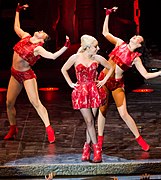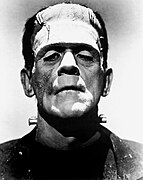Emelia Quinn
Emelia Quinn (born 1992) is a British scholar of English known for her work developing vegan theory. She is an assistant professor of world literatures and environmental humanities at the University of Amsterdam.
Career
Quinn was introduced to animal studies by Jason Edwards during her MA studies at the University of York.[1] She went on to read for a DPhil at the University of Oxford.[2] Her thesis, which was submitted in 2019, was entitled The monstrous vegan: reading veganism in literature, 1818 to present.[3] The thesis was supervised by Ankhi Mukherjee, and examined by Anat Pick and Sophie Ratcliffe.[1] While at Oxford, Quinn co-edited, with Benjamin Westwood, the collection Thinking Veganism in Literature and Culture: Towards a Vegan Theory. This was published in 2018 by Palgrave Macmillan as part of their Palgrave Studies in Animals and Literature series.[4]
Quinn briefly taught art history at the University of Birmingham before joining the University of Amsterdam (UvA) as a Lecturer in English in 2019. In 2021, she became an assistant professor of world literatures and environmental humanities at UvA.[2] In the same year, she published the monograph Reading Veganism: The Monstrous Vegan, 1818 to Present with Oxford University Press's Oxford English Monographs series.[5] This book was based on Quinn's doctoral thesis.[1] In 2021, Quinn an became editor of the Oxford University Press and English Association journal The Year's Work in Cultural and Critical Theory,[2][6] and, in 2022, Edinburgh University Press published The Edinburgh Companion to Vegan Literary Studies, which Quinn co-edited with Laura Wright.[7]
Research
Vegan camp
Drawing upon queer theory, especially Susan Sontag's essay "Notes on 'Camp'", Quinn argues for a vegan form of the camp aesthetic that she calls "vegan camp". She defines this as
an aesthetic lens and sensibility that, while acknowledging the extremity of animal suffering, seeks to draw sustenance from what has previously only caused pain. It ... offers a riposte to the unprecedented scale of animal death and the lived experience of late capitalism in which political resistance feels futile. In drawing pleasure from a state of mass violence, vegan camp provides sustenance for individual vegans while refusing a damaging sense of the vegan as a morally righteous "beautiful soul." ... A camp sensibility performs the inescapable complicity of vegan lives in mass suffering. This performance of complicity ... provides a way of working through horror and continuing to fight for change in the face of the seeming impossibility of living an ethical life. In this sense, complicity affords a temporary mode of ethical affiliation, a way of occupying the present that acknowledges rather than castigates feelings of failure and insufficiency.[8]
Examples of the vegan camp aesthetic identified by Quinn include a work of scrimshaw in the Hull Maritime Museum's Turner and the Whale exhibition, Lady Gaga's meat dress, and certain mock meats.[9]
Monstrous veganism
Reading Veganism introduces the "monstrous vegan". Quinn identifies four traits of the monstrous vegan:
First, monstrous vegans do not eat animals, an abstinence that generates a seemingly inexplicable anxiety in those who encounter them. Second, they are hybrid assemblages of human and nonhuman parts, destabilizing species boundaries. Third, monstrous vegans are sired outside of heterosexual reproduction, the product of male acts of creation. And, finally, monstrous vegans are intimately connected to acts of writing and literary creation.[10]
The trope of the monstrous vegan begins, Quinn argues in Reading Veganism, with the creature created by Victor Frankenstein in Mary Shelley's 1818 novel Frankenstein; or, The Modern Prometheus.[10] She further identifies monstrous vegans in the work of H. G. Wells (including The Island of Doctor Moreau and The Time Machine), Margaret Atwood (including the MaddAddam trilogy), J. M. Coetzee (specifically the character Elizabeth Costello of the eponymous novel and The Lives of Animals), and Alan Hollinghurst (in The Swimming-Pool Library and The Sparsholt Affair).[11][5]
Selected works
- Quinn, Emelia, and Benjamin Westwood (2018). Thinking Veganism in Literature and Culture: Towards a Vegan Theory. Basingstoke: Palgrave Macmillan.[4]
- Quinn, Emelia (2019). Reading Veganism: The Monstrous Vegan, 1818 to Present. Oxford: Oxford University Press.[5]
- Quinn, Emelia (2020). "Notes on Vegan Camp". PMLA. 135 (5): 914–930. doi:10.1632/pmla.2020.135.5.914. S2CID 233316079.
- Wright, Laura, and Emelia Quinn, eds. (2022). The Edinburgh Companion to Vegan Literary Studies. Edinburgh: Edinburgh University Press.
References
- ^ a b c Quinn, Emelia (2019). Reading Veganism: The Monstrous Vegan, 1818 to Present. Oxford: Oxford University Press. pp. v-vi.
- ^ a b c "Dr. E.J. (Emelia) Quinn". University of Amsterdam. 22 October 2023. Archived from the original on 2 December 2023. Retrieved 5 December 2023.
- ^ "The monstrous vegan: reading veganism in literature, 1818 to present". University of Oxford. Archived from the original on 2 December 2023. Retrieved 5 December 2023.
- ^ a b Reviews:
- Todd, Megan (2020). "Thinking Veganism in Literature and Culture: Towards a Vegan Theory". Journal of Cultural Analysis and Social Change. 5 (1) 7: 07. doi:10.20897/jcasc/8410.
- Poirier, Nathan (2020). "Thinking Veganism in Literature and Culture: Towards a Vegan Theory". The Journal of Popular Culture. 53 (1): 235–7. doi:10.1111/jpcu.12876. S2CID 216175561.
- Mann, Noelle (2021). "Book Review: Emelia Quinn and Benjamin Westwood (eds.), Thinking Veganism in Literature and Culture: Towards a Vegan Theory" (PDF). Gothic Nature (2): 207–9. Archived (PDF) from the original on 5 December 2023. Retrieved 1 December 2023.
- ^ a b c Reviews:
- Giraud, Eva Haifa (2022). "Animal studies". The Year's Work in Critical and Cultural Theory. 30 (1): 18–39. doi:10.1093/ywcct/mbac013.
- Wright, Laura (2022). "Book Review: The Monstrous Vegan: Reading Veganism in Literature, 1818 to Present by Emelia Quinn". Literature & History. 31 (1): 105–7. doi:10.1177/03061973221096300.
- Elliott, Alba (2023). "When vegans are monstrous". Humanimalia. 13 (2): 223–9. doi:10.52537/humanimalia.12319.
- ^ "The Year's Work in Critical and Cultural Theory: Editorial board". Oxford University Press. Archived from the original on 5 December 2023. Retrieved 5 December 2023.
- ^ "The Edinburgh Companion to Vegan Literary Studies". Edinburgh University Press. Archived from the original on 2 December 2023. Retrieved 5 December 2023.
- ^ Quinn, Emelia (2020). "Notes on Vegan Camp". PMLA. 135 (5): 914-930 (at pp. 915-6). doi:10.1632/pmla.2020.135.5.914. S2CID 233316079.
- ^ Quinn, Emelia (2020). "Notes on Vegan Camp". PMLA. 135 (5): 914-930 (at pp. 919-20). doi:10.1632/pmla.2020.135.5.914. S2CID 233316079.
- ^ a b Quinn, Emelia (2019). Reading Veganism: The Monstrous Vegan, 1818 to Present. Oxford: Oxford University Press. p. 3.
- ^ Quinn, Emelia (2019). Reading Veganism: The Monstrous Vegan, 1818 to Present. Oxford: Oxford University Press. passim.
Further reading
- Taylor, Chloë (2024). "Vegan Camp: An interview with Emelia Quinn". In Taylor, Chloë (ed.). The Routledge Companion to Gender and Animals. Abingdon: Routledge. pp. 177–191. doi:10.4324/9781003273400-12.
External links
| Interviews | |
|---|---|


